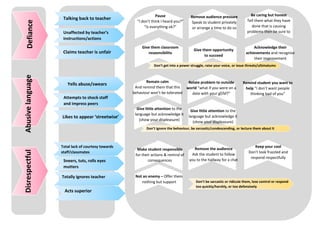
Behaviour-consequence chart
- 1. Talking back to teacher Unaffected by teacher’s instructions/actions Claims teacher is unfair Pause “I don’t think I heard you?” “Is everything ok?” Remove audience pressure Speak to student privately or arrange a time to do so later Be caring but honest Tell them what they have done that is causing problems then be sure to listen to them as well Give them classroom responsibility Give them opportunity to succeed Acknowledge their achievements and recognise their improvement Don’t get into a power struggle, raise your voice, or issue threats/ultimatums Yells abuse/swears Attempts to shock staff and impress peers Likes to appear ‘streetwise’ Remain calm And remind them that this behaviour won’t be tolerated Relate problem to outside world “what if you were on a date with your gf/bf?” Remind student you want to help “I don’t want people thinking bad of you” Give little attention to the language but acknowledge it (show your displeasure) Give little attention to the language but acknowledge it (show your displeasure) Don’t ignore the behaviour, be sarcastic/condescending, or lecture them about it DefianceAbusivelanguage Total lack of courtesy towards staff/classmates Sneers, tuts, rolls eyes mutters Make student responsible for their actions & remind of consequences Remove the audience Ask the student to follow you to the hallway for a chat Keep your cool Don’t look frazzled and respond respectfully Not an enemy – Offer them nothing but support Don’t be sarcastic or ridicule them, lose control or respond too quickly/harshly, or too defensively Disrespectful Totally ignores teacher Acts superior
- 2. Frequently out of seat, wandering around room Fails to bring equipment to class Short attention span, daydreams etc. Organise the lesson Make small ‘chunks’ with achievable tasks Interests Find and use their interests to get them engaged 1:1 time Regularly to show you care and won’t give up on them Ask them how can you make the lessons more appealing? Explicit instructions so they know what to do Acknowledge their achievements and recognise their improvement Don’t think “they should just get on with it”, belittle them, or nag/lecture them Co-operative work to give opportunity to practice appropriate social behaviour Give them a responsibility or task to meet need for empowerment Don’t let it disrupt lesson flow unless behaviour actually stops flow of lesson Proximal praise for on-task students Speak early to persistent interrupters & explain effect of behaviour on group Adequate opportunity to talk as students often talk out of turn because they don’t think they’ll get a turn Don’t neglect the opportunity to teach good social skills, give undue attention to their interruptions RefusaltoworkInterrupting Shouting out Makes silly/rude comments Tries to engage teacher in off- topic conversations Ignoring teacher and talking over them Praise privately when student makes improvements Making silly noises e.g. tapping on the desk Purposely trying to annoy the teacher Change seats Seat student next to you & keep an eye on them Explain effect of behaviour Make student aware of impact on other students Reinforce +ve behaviour Catch them being good and praise them Involve them in tasks Don’t get into a power struggle, raise your voice, or issue threats/ultimatums Annoying